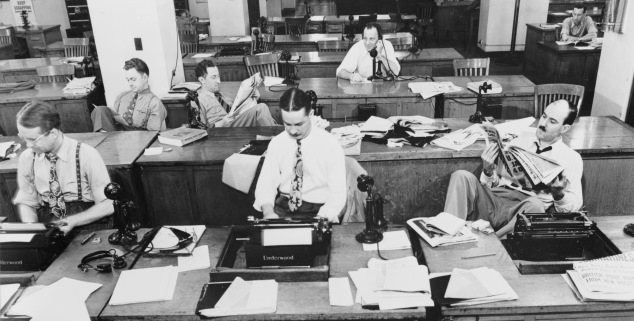
Reporters frequently enter public relations, but some experts say they don’t always succeed. Photo credit: The New York Times via Wikipedia
Journalists seem to be piling into public relations. That’s no wonder considering the massive layoffs in media, growing pay gap between journalists and PR pros, and increasing number of PR jobs available.
The number of reporting jobs fell from 52,550 in 2004 to 42,280 in 2014, according to Labor Department statistics. PR jobs increased from 166,210 to 208,000 in the same period. Meanwhile, the pay gap between PR pros and journalists has increased. A Pew Research Center report says journalists now earn 65 percent of the median income of PR professionals.
Two 2015 Pulitzer Prize winning reporters had already accepted PR jobs by the time their awards were announced this year, according to The Washington Post. Rob Kuznia of the Daily Breeze in Torrance, Calif., was having difficulty living on a reporter’s salary. Natalie Caula Hauff of The Post and Courier in Charleston, S.C., sought a more family-friendly career.
Two of the four reporters who won the public service Pulitzer for the Oregonian in 2001 have left journalism, the Post adds. One took a government communications job; the other became a college journalism instructor.
Do Reporters Make Good PR Pros?
But do journalists make good PR pros? Many PR experts say their backgrounds provide excellent PR skills, but opinions are far from unanimous.
Rosanna Fiske, now vice president, corporate communications, at Wells Fargo, argues that journalists don’t always make good PR pros. Substantial numbers of laid-off journalists began turning to PR careers following the Great Recession in what can be called the great journalism-to-PR migration.
“But where there is prosperity, concerns often can be found lurking in the shadows,” Fiske wrote in an article for Poynter.
At least some PR veterans worry that former journalists may come to PR with a “communication culture of false urgency” and may not appreciate the work that reputation management entails.
“I know many journalists who enter PR with stellar contacts, superb storytelling skills and a well-honed, experienced knowledge of the media business. They know how to sell a story — to their editor,” wrote Fiske, who was then chair and CEO of the Public Relations Society of America and program director in the School of Journalism and Mass Communication at Florida International University in Miami.
What They Don’t Know
Many journalists may not know how to pitch new business to a client, perform market research to develop a strategic communications plan, or know the public relations industry code of ethics.
Many excellent PR practitioners are former reporters or have journalism degrees, and former journalists have top-notch writing and media relations skills and an appreciation for deadlines. But some former journalists fare poorly in PR because they don’t understand that media relations is just one part of the many functions of PR. Some of the hard-bitten journalists may lack skills in diplomacy and persuasion. Others may have anti-business leanings developed during their years as journalists.
Seth Linden, himself a former journalist and now executive vice president at Dukas Public Relations, agrees that some former journalists fail in the PR profession.
“For most PR professionals, these basic skills may sound intuitive, but I’ve watched former reporters who don’t adapt well to the subtleties and sense of savior faire that is required in the business world. “They somehow can’t accept that they’re not here to fight business; they’re part of it.”
Those who succeed learn to be diplomatic and master email and phone etiquette.
Many experts also say analytical skills are now a prerequisite for PR pros. PR staff must be able to monitor and measure media and quantify their results in order to win support from their executive leaders.
Executives hiring journalists for PR positions must recognize that not all journalists are sure bets for success in PR. PR requires a certain “smoothness” not always present in journalists. The job candidates most likely to succeed are those who combine a gracious personality, helpful attitude and ability to plan with the traditional journalism skills like interviewing, listening, reporting and storytelling.
Bottom Line: As more journalists enter public relations, PR pros are more likely than ever to be working alongside former reporters. As the trend continues, PR executives may be considering hiring journalists more often. But some PR experts warn that former journalists don’t always become good PR pros.
William J. Comcowich founded and served as CEO of CyberAlert LLC, the predecessor of Glean.info. He is currently serving as Interim CEO and member of the Board of Directors. Glean.info provides customized media monitoring, media measurement and analytics solutions across all types of traditional and social media.





As the former CEO of KPR, Inc., for 32 years (prior to retiring), I usually found that the best prospects for a PR career had a background in marketing rather than journalism. Marketing gave them a deep understanding of messaging and reputation management. Writing in a journalistic style could be taught a lot easier than strategic thinking.